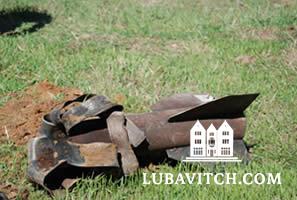(lubavitch.com) Municipal elections were held in towns and cities all over Israel on Tuesday, and in the beleagured town of Sderot, near the Gaza border, the local Chabad center was considered safe enough, and politically neutral enough, to serve as a polling station.
“They choose where voting will take place based on how protected the building is [from Kassam rockets],” explained Sderot shlucha Tzivia Pizem. “The other locations were mostly schools, but in our neighborhood there is no school, and we’re considered a neutral place.”
Any public activity in Sderot, including voting, is fraught with danger. Less than a mile from Gaza, the city – home to approximately 19,000 people – continues to be a prime target for Hamas.
For several weeks in September and October the skies over Sderot were relatively quiet, but Palestinians started a new barrage of Kassams in November, which have continued despite an IDF raid into Gaza last week.
The pre-election campaigns were heated this year, with voters trying to predict which candidates would work best with the national government to protect Sderot. According to Israel National News, between 2001 and 2007, the city has been battered by 6,300 rockets launched from within Gaza.
Anav Silverman, international correspondent for the Sderot Media Center, says that in a single 24-hour period between November 4-5, Hamas fired almost 70 rockets into the Negev. “Sderot children have once again returned to the routine of waking up at two in the morning to the sound of the siren, followed by a rocket explosion,” she said.
In light of the dangers posed by Kassams, polling centers for Tuesday’s election were chosen on the basis of the thickness of their cement walls. The 500-square-meter Chabad centre, which used to serve as a school, not only has thick walls but also the additional advantage of two floors.
Two floors is always better,” Pizem said, “because while Kassams are strong enough to penetrate the cement walls on the top floor, they are not strong enough to then penetrate through to the first floor. They lose steam after crashing through the first wall.”
On most days, the “Code Red” siren goes off multiple times, each time warning residents that in 15 seconds a rocket will fall. The daily attacks have caused a complete disruption of daily life, with outdoor playgrounds standing empty and, Pizem said, children turning off the water in their showers every few seconds so they can be sure not to miss a siren warning.
As of March 2008, between 10-25% of the residents of Sderot had left town, breaking down both the city’s economy and its morale. Outgoing mayor Eli Moyal threatened to resign his position in December of 2007, in protest against the Israeli governments failure to protect Sderot. He eventually retracted the resignation, but did not run again in Tuesday’s elections.
According to the local newspaper Din v’Cheshbon, almost 11,000 people voted in Sderot, a full 68 percent of eligible voters. David Buskila won the mayoral seat, with 45 percent of the votes. Din v’Cheshbon described his campaign as notable for reaching out to young voters and to Russian immigrants, and for his support from the national ruling Kadima party.
Other top contenders were Achlama Peretz (the wife of former Minister of Defense Amir Peretz), who would have been Sderot’s first female mayor but garnered only 25 percent of the votes; and Alon Davidi, an activist with a history of working to improve Sderot’s security and Israelis’ awareness of the city’s plight. Much younger than the other candidates, he received 24% of the votes.
The day before the election, Pizem told Lubavitch.com that the Sderot Chabad Center’s absolute neutrality when it comes to elections is a reason it was chosen as a polling station.
“We don’t get involved at all,” she said. “Whoever comes [into power], we hope he’ll do the best for Chabad.”
Multiple attempts to reach the Sderot mayor’s office for comment were unsuccessful.

Be the first to write a comment.